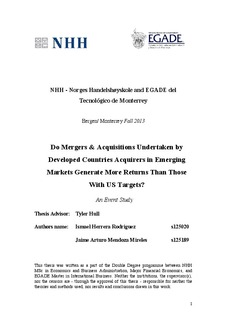Do mergers & aquisitions undertaken by developed countries acquirers in emergin markets generate more returns than those with US targets? : An event study
Master thesis
Permanent lenke
http://hdl.handle.net/11250/195667Utgivelsesdato
2013Metadata
Vis full innførselSamlinger
- Master Thesis [4372]
Sammendrag
The purpose of this master thesis is to answer whether a Developed Country firm
would generate higher returns to its shareholders by acquiring a company from the US
or by acquiring an Emerging Market target.
It includes an extensive literature review that covers the main motives and theories
behind M&As. Also, the cross border M&A theory and the rationale behind the
internationalization and location decisions are discussed. Furthermore, an analysis of
empirical studies in US Domestic M&A, cross border M&A and M&A in Emerging
Markets is presented.
An event study methodology is used to test the thesis’ hypothesis. A total of 517
M&A deals from 2010 to 2012 were analyzed and a sample of 195 deals was used. A
mean adjusted returns model is to estimate normal returns and two significance tests
are carried out to test the statistical significance of the results.
Our results showed non statistically significant negative cumulative abnormal returns
of acquirer companies in the whole sample. Furthermore, the M&A deals with
Emerging Markets Targets showed lower cumulative average abnormal returns
(CAARs) for the acquiring firms in comparison to the M&A deals with US targets.
Using an event window of 11 days, the estimated CAARs for the M&A deals with US
targets is -0.98%, while the CAARs for the M&A deals with Emerging Market targets
is -2.06%. In the largest event window (51 days) the CAARs for the former sample is
estimated to be -3.57% while, for the latter sample, is estimated at -9.6%.
